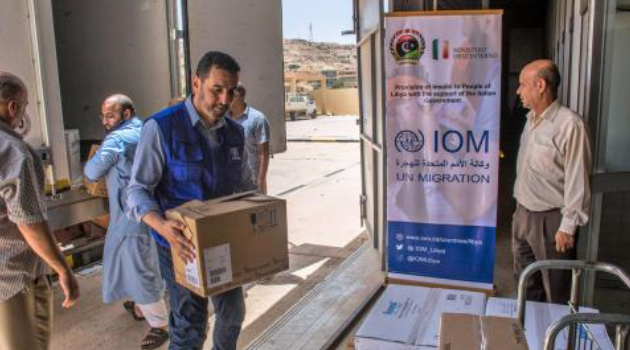IOM, the UN Migration Agency, in close collaboration with World Health Organization (WHO) and the Libyan Ministry of Health, has assisted seven municipalities in Libya with a supply of much needed insulin with the support and funding of the Italian Government.
According to WHO, 13.7 per cent of Libyans are diabetic, and the availability of insulin remains the most pressing need for patients. With the support of the Italian Ministry of Interior, the Libyan Ministry of Health, and WHO, IOM provided insulin in seven days to seven municipalities in the east, west and south of the country, namely Tobruk, Benghazi, Sirte, Sabha, Zintan, Gharyan and Tripoli. The insulin was distributed by the municipalities to local health institutions.
“Continuing to receive assistance is our most important concern, as we do not wish to give people hope and then take it back from them,” said Omran al-Omyani, Health Committee Head of the Municipal Council in Zintan. “The last time we received medicine, the quantity was not sufficient for all. We also have another batch of medicine in the east, but we have not been able to bring it here due to lack of proper transportation.”
The health sector in Libya has been deeply affected by the ongoing conflict. Due to lack of stability, getting supplies and resources to health institutions has been one of the main challenges faced by the Libyan Ministry of Health.
“This campaign is part of IOM’s expanding support to Libyan Health System in reaching out to its communities,” said IOM’s Health Programme Manager, Dr. Arif Hussain. “The intervention was coordinated closely with the Libyan Ministry of Health, the seven targeted municipalities and WHO to ensure that affected patients are guaranteed access to much-needed healthcare.”
Under the current crisis and limited government resources especially for the health sector, IOM is scaling up its support to Libyan communities and authorities. In March 2018, the organization provided much needed medical equipment to the National Center for Disease Control (NCDC) to improve early detection of TB, especially MDR (Multiple Drug resistant) TB cases and provided vaccine (cold) boxes for the immunization programme.
IOM is also in the process of providing equipment and supplies to selected health facilities including primary health care centres and secondary care hospitals, besides capacity building interventions for the health care providers.
Additionally, IOM continues to provide direct health assistance to migrants once they are returned to the Libyan shore at disembarkation points, as well as essential medical care in detention centres in Libya.
(Source: IOM)





